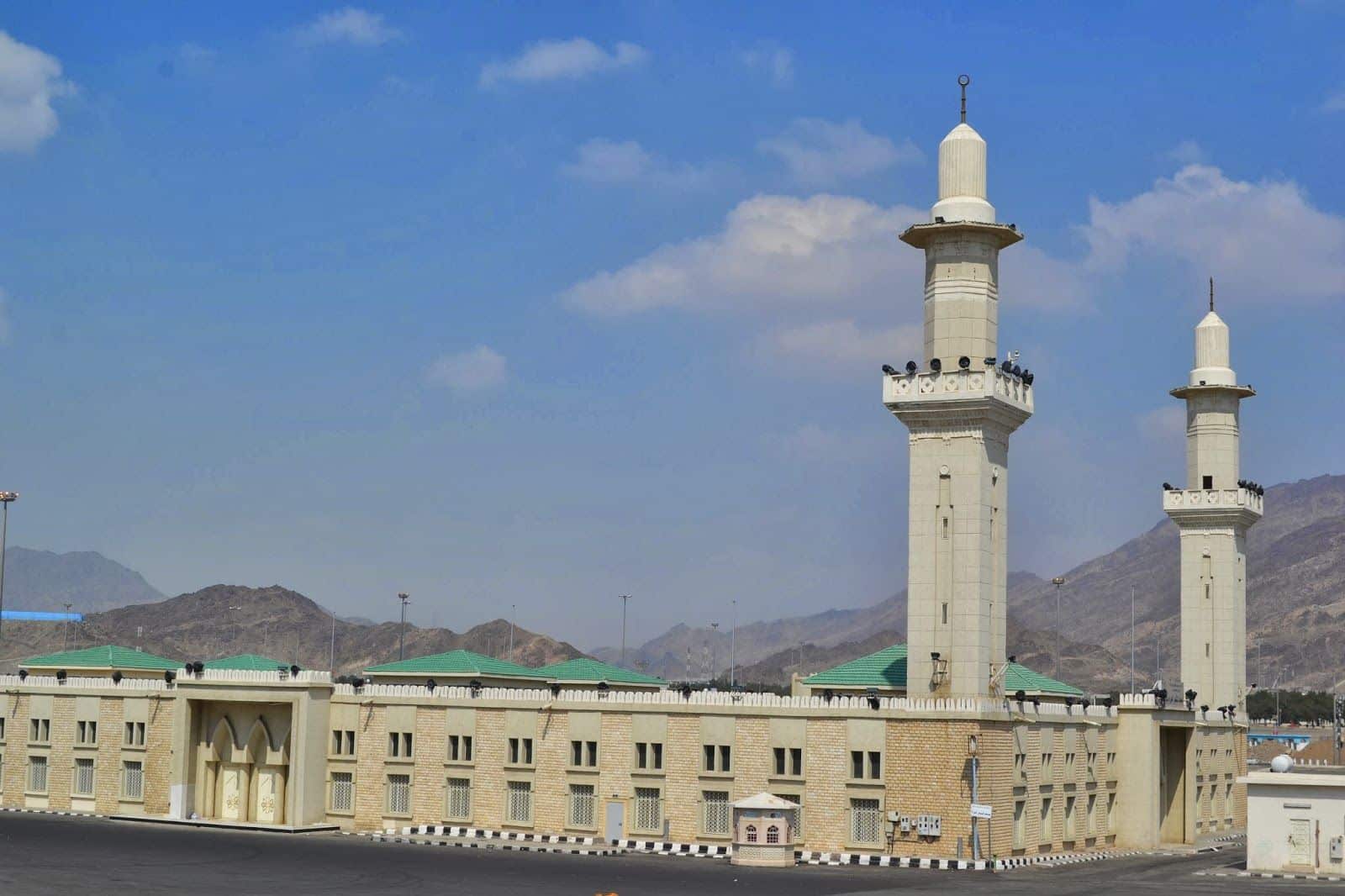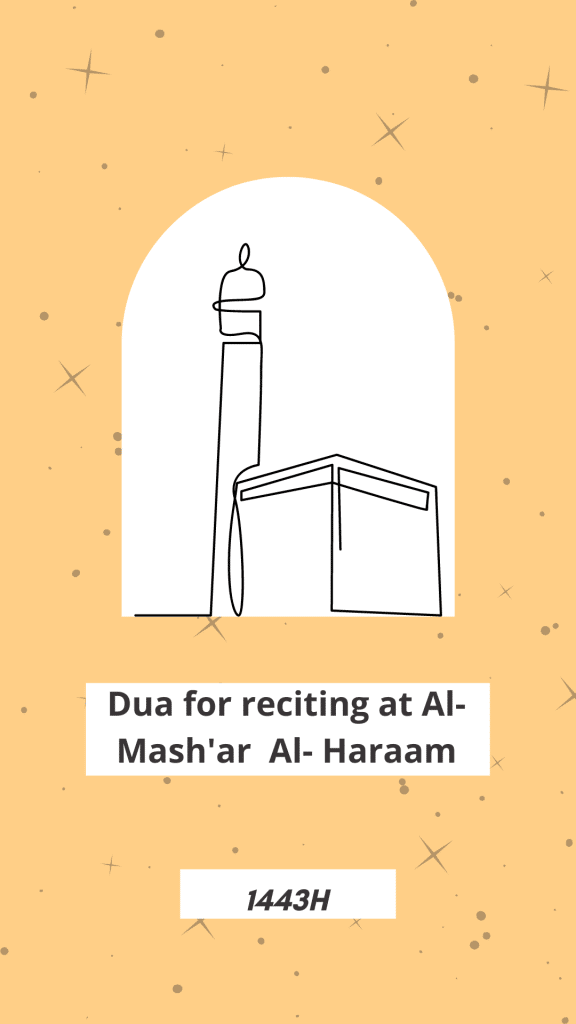Dua For reciting at Al-Mash’ar Al-Haram
First, We need to know what is Al- Mash’ar Al- Haram:
Al Mash’ar Al Haram is the Valley between Muzdalifa and Mina is where pilgrims should make a Du’a after sleeping in Muzdalifah (Al-Mash’ar Al-Haram) on their way to Makkah to throw Jamrat al-Aqabah on the morning of the 10th of Dhul-Hijjah. [1]
Allah says: {But when you depart from ‘Arafat, remember Allaah at Al-Mash’ar Al-Haram.}[Quran 2:198].
The scholars, may Allaah have compassion on them, were divided on the meaning of Al-Mash’ar Al-Haram. Some of them believe it refers to the entire Muzdalifah (Al-Mash’ar Al-Haram). ‘Al-Muzdalifah has three names: Muzdalifah, Jam’, and Al-Mash’ar Al-Haram,’ said Ibn Qudaamah, may Allaah have mercy on him. So, Al- Mash’ar Al- Haram is a name of three names refers to Muzdalifah.
Some other scholars, may Allah have compassion on them, believe it relates to the Quzah mountain in Muzdalifah (Al- Mash’ar Al- Haram) . ‘Ataa, may Allaah reward him, interpreted Al-Mash’ar Al-Haraam to imply Quzah, the complete Muzdalifah (Al- Mash’ar Al- Haram). The mountain of Quzah was once located in Muzdalifah, but it was removed and replaced.
According to Al-Ibtah, Muzdalifah was the location of Prophet Adam’s (AS) Maghrib and Isha prayers. Muzdalifah is also known as Al-Ibtah, which means “flat area.” “This place is called al-Ibtah because Prophet Adam (AS) was assigned to stay at Muzdalifah(Al- Mash’ar Al- Haram) till daybreak,” says Imam al-Sadiq (AS).
The scholars disagreed on the interpretation of Al-Mash’ar Al-Haraam. Some of them believe it refers to Muzdalifah(Al- Mash’ar Al- Haram) ; please refer to Al-interpretation Qurtubi’s of the Saying of Allaah (which means): “But when you depart from ‘Arafaat, mention Allaah at Al-Mash’ar Al-Haraam.” [Quran 2:198]. Some scholars believe it alludes to a mountain called Qazah in Muzdalifah (Al- Mash’ar Al- Haram).
According to Salim, ‘Abdullah bin ‘Umar used to send the weak among his family to Mina early in the morning. So they would leave Al-Mash’ar Al-Haram (that is, Al-Muzdalifa) at night (after the moon had set) and invoke Allah as much as they could, and then return (to Mina) before the Imam had begun his journey from Al-Muzdalifa (Al- Mash’ar Al- Haram) to Mina.
As a result, some would arrive in Mina during the Fajr prayer, while others would arrive later. They would hurl pebbles on the Jamra (Jamrat-Al-‘Aqaba) as they arrived at Mina. “Allah’s Messenger gave them (weak people) permission to do so,” Ibn ‘Umar used to say. 1676, Sahih al-Bukhari
Dua For reciting at Al-Mash’ar Al-Haram In Arabic – 1
أَللّهُ أَكْبَرُ أَللّهُ أَحَدٌ لاَإِلَهَ إِلاَّ اللهُ
Dua For reciting at Al-Mash’ar Al-Haram In English transcription – 1
We say at Al- Mash’ar Al-Haram: Allaahu ‘Akbar Allaahu ‘Ahad Laa ‘ilaaha ‘illallaah
Dua For reciting at Al-Mash’ar Al-Haram In English – 1
Dua to be recited at Al- Mash’ar Al-Haram: Allah is the Most Great. Allah is One. There is none worthy of worship but Allah.
Muslim 2:891

SUPPLICATIONS TO BE MADE DURING HAJJ
Supplications during the Hajj (Dua):
Allah, the most glorious, commands his disciples to respond to their supplications, the hajj. The scriptures and texts signify the importance and value of doing Dua in Islam.
Dua is said to be essence of worship, the heart of Ibadah. It protects the believer from all evil and is the greatest support for pain and suffering. Affordable Hajj Packages (Click Here) Dua helps believers find peace. It opens hearts and relieves stress and anxiety. It is the only refuge for helpless, submissive and helpless people.
Without a doubt, the most unfortunate of all are those who are unable to provide Allah with supplication. The supplications during the Hajj are much more likely to receive an answer, for the supplications become much greater during the holy pilgrimages and the supplicants of the virtuous travelers always have the answer.
Prophet Muhammad (PBUH) said: “Three supplications are definitely answered, and there is no doubt about them: that of a father, that of a traveler and that of a victim.” [Abu Daawood and others] The importance of supplication during Hajj can be assessed by the following hadeeth.
The Prophet Muhammad (PBUH) said: “The delegation [guests] of Allah, the Exalted, is composed of three persons: that is, jihad [i.e. fight for the cause of Allah], the one who performs’ Omrah [small pilgrimage]] and the one who performs Hajj; He was called and they answered.
They were asked of him and he gave them. [Ibn Maajah] We have been supplanted by supplications made during the Hajj are more likely to be answered at different stages of the pilgrimage:
Supplications during circumambulation (Tawaf):
Although there is no specific Dua to recite during circumambulation, the pilgrim can do all the supplications he needs. During circumambulation, it is suggested to ask Allah, the Almighty, for all that is good in life after life.
The supplication made during the pilgrimage by the Prophet Muhammad (PBUH) at the time of circumambulation is mentioned below: “Rabbanaa aatinaa fid-dunyaa hasanah wa fil-aakhirati hasanah, wa qinaa ‘athaab an-naar.” [Abu Daawood] (Translation: “Our Lord, grant us in this world [all that is good] and in the Hereafter [all that is good] and protect us from the torture of fire.”).
He recited this duet between the two corners of the Kabah (making the round between the Yemeni corner (Ar Rukn Al Yamaani) and the black stone).
Supplications on the Safa and Marwah mountains:
Jabir (RA) describes the journey of the Prophet Muhammad (PBUH) on the Safa and Marwah mountains, as follows: “… He first ascended to As-Safaa until he saw the house [Al-Masjid Al-Ḥaraam].
Facing the Qiblah, he started his Du’aa ‘saying,’ Laa illaah illa Allah, Allahu Akbar ‘, then he said:’ Laa ilaaa illa Allah wahdahu laa shareeka lahu, lahul-mulk wa lahul-hamd, wa huwa ‘ala kulli shay’in qadeer, laa ilaaha illaa Allah wahdahu, anjaza wa’dahu, wa nasara’ abdahu, wa hazam al-ahzaba wahdah. ‘ “[Muslim]
(Translation: There is no other god than Allah, he is One and has no partner, his sovereignty, his praise is due, and he is powerful over everything. other god than Allah, he fulfilled his promise, made his servant victorious, and conquered the Confederates alone.)
Jaabir (RA) added: “… The Prophet (PBUH) uttered these words three times, supplicating the two. He then descended and went to [Mount] Marwah. When his feet touched the bottom of the valley, he walked with a rapid step; and when he began to climb, he returned to his normal walking pace until he reached [Mt.] Marwah. There he did as in As-Safa … “[Muslim]
Supplications of Arafah’s day:
The last prophet Allah (PBUH) said: “The best supplication is the one done on Arafah’s day, and the best thing I have ever said, as well as all the previous prophets, is’ Laa ilaaha illa Allah wahdahu shareeka lah, lahul-mulk wa lahul- Ham wa Wawa ‘Ala Kulli Shay’in Qadeer.’ “[At-Tirmithii]
(Translation: “There is no god except Allah alone, he has no partners, all sovereignty and praise belongs to him and he is above all, almighty.”) The importance of supplications during the Hajj, especially at the time of Arafah, can be judged by the fact that Prophet (PBUH) spent the day of Arafah on the top of his camel by raising his hands and reciting supplications. above from sunrise to sunset.
Supplications to Al-Mash’ar Al-Haram (Muzdalifah):
Jaabir (RA) reported: “… He [the Prophet, (PBUH)] ascended [his camel] al-Qaswaa ‘. Arriving at Al-Mash’ar Al-Haram, he faced the Qiblah and began his dua by praying to Allah the Exalted, declaring the uniqueness of Allah and glorifying him, and stood until the day be very clear … “[Muslim]
Supplications at the time of Tashreeq, Sughra Jamrah and Wusta Jamrah: The days of Tashreeq are the 11th, 12th and 13th of Zul Hajj. Prophet Muhammad (PBUH) used to face the Qiblah, raise his hand to implore Allah for a long time. He practiced it after stoning the Shetan (satin). Supplications by drinking the water of Zamzam: If you have health problems, one of the best pleas for Hajj is using Zamzam water. The Prophet (PBUH) said: “The water of Zamzam serves the purpose for which it was drunk.” [Ibn Maajah]
The Hajj is one of the most incredible things a Muslim can observe. The sheer number of ujjj (pilgrims) is only realised after attending this solemn gathering. Even so, this is only a fraction of the number of people who responded to Ibrahim’s (alayhi al-Salm) appeal to proclaim the Hajj.
The rites of worship that have been given for us are full of wisdom because they have been prescribed by the Lord of the Worlds. Allh understands us best; He is All-Wise and All-Aware, and He does not legislate for us what would be useless to us. Just one part of a worship service can provide so many teachings, thoughts, and points of usefulness. The believer should not approach worship of Allh (subnahu wa taal) carelessly, but rather with a mindful heart, eager to follow His mandates and refrain from His prohibitions.
I hope that readers would appreciate staying in Muzdalifah more and will attempt to think on the various rites of the holy journey of Hajj.



